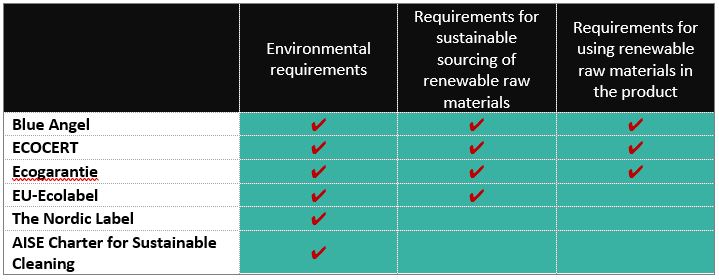Environmental requirements

In general, all of the mentioned labels demand higher environmental standards as in the conventional production. All of them require a restriction of special hazardous chemicals, a restriction of aquatic toxicity, a reduction of the packaging quantity, the use of environmentally friendly packaging material and information about the product use. But it is important to know that labels can differ in their specific requirements and criteria for each of these categories.
Sustainable sourcing of renewable raw materials
In addition to environmental standards some labels demand a sustainable sourcing of renewable raw materials. The Blue Angel and EU-Ecolabel require a sustainable sourcing of palm oil and palm kernel oil. This can be verified by certification schemes such as the Roundtable on Sustainable Palm Oil, for instance.
For the Ecocert label plant ingredients are all authorised insofar as their production or wild harvesting does not involve damage to the countryside or unbalancing ecosystems, and they do not belong to endangered species. There is no specific positive list within this standard. They must be guaranteed non-GMO and plant ingredients must not be extracted with petrochemical solvents.
Ecogarantie allows bio-based ingredients from certified organic agriculture, wild-harvested in an officially protected zone and certified fair trade agriculture.
Using renewable raw materials
The requirements of the Blue Angel for using renewable raw materials differ between different cleaning products. For laundry detergents the proportion of carbon from renewable raw materials in the total carbon in the surfactant system must be at least 40%. In hand dishwashing detergents, all-purpose cleaners, sanitary cleaners and glass cleaners the proportion of renewable carbon in the total carbon in the surfactant system must be at least 50%.
Ecocert provides two labels, one for natural detergents and one for natural detergents made with organic. For the first one a maximum of five percent of synthetic (fossil) ingredients among a restrictive list is allowed. In addition for the organic label a minimum of ten percent of ingredients has to be sourced from organic farming.
Ecogarantie excludes fossil sources or only assign time-limited derogations to them when for the time being no other solution is available.
—
07/02/2018
